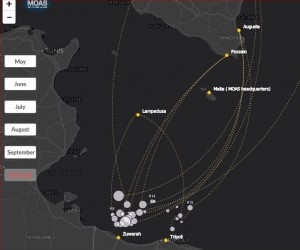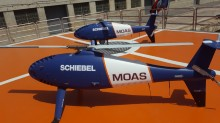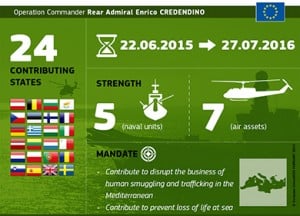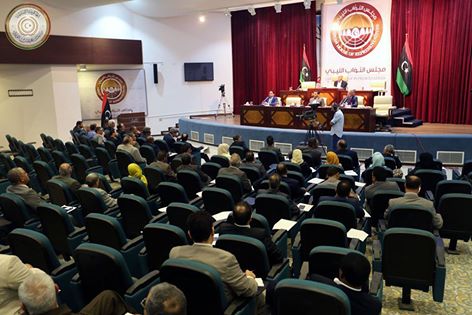By Sami Zaptia.

Malta, 30 May 2016:
Illegal migrants crossing the Mediterranean Sea from the Libyan coast are expected to rise through summer . . .[restrict]as a result of the weak central authorities there and the closure of the Balkan and Turkish routes. The comment was made at a migration event in Malta on Friday.
The event came surrounded by three days of successive drownings of migrants off the Libyan coast. The UNHCR spokesperson, Carlotta Sami, commenting over the weekend on what she called a ‘’Mediterranean tragedy’’ added that ‘’at least 9.000 persons have died in 30 months, 300 every month. Is this acceptable as a normality, is this acceptable? ‘’, she asked.
Commenting on the number of deaths at sea she said that ‘’We’ll never know the exact number, we’ll never know their identity but survivors tell that over 500 human beings died.’’ She later updated the death toll number upwards to 700. The UNHCR called it the worse week in 2016 for migrant deaths at sea.
Nearly 14,000 have been rescued and taken to Italy from the sea opposite the western Libyan coast so far this year. More than 12,000 have been rescued just in the last week.
Forecasts of how many illegal migrants could cross the Libyan Sea are politically laden. British media has quoted as high as one million based on the 2015 figures inflated by the Balkan and Turkish crossings.
EUROPOL, the EU’s police force estimated 800,000. Federica Mogherini was reported by British media as saying 500,000 are currently waiting in Libya. Critics say the figures are inflated and will probably be about 200,000.
The tragic events this week coincided with a conference on illegal migration in Malta on Friday where a number of experts discussed the subject. Organisers, Malta-based search and rescue NGO Migrant Offshore Aid Station (MOAS) said that it alone had assisted over 13,000 migrants in distress since launching in 2015 who had risked death to save themselves and their families from war, persecution and hardship across the Central Mediterranean, Aegean and Andaman seas.
The search and rescue operations were carried out by their ship the Phoenix has two remotely operated camcopter drones which circle the skies around it looking for migrant boats in distress, thereby significantly expanding its search radius of operation.

Philanthropist and MOAS co-founder, Christopher Catrambone, says his NGO believes that ‘’no one deserves to die at sea’’. He said that in 2015 three quarters of all migrant deaths worldwide occurred in the Mediterranean.
At the event on Friday, MOAS launched its second vessel Topaz Responder to join its sister rescue vessel the Phoenix. The launch of the new rescue ship in itself indicates sadly that MOAS is anticipating a busy 2016 summer at sea.
MOAS is by no means operating alone in the Mediterranean. The EU has its own EUNAVFOR MED Operation Sophia, commonly referred to as Operation Sophia for short. Its mandate was supposed to end in July this year but was extended and expanded earlier this month to 2017. It will also include the offshore training of Libyan coast guards and navy.

Operation Sophia says it has 24 contributing countries with 5 naval units and 7 air assets. It describes its mandate to ‘’tackle the root causes’’ and ‘’contribute to disrupt the business model of human smuggling and trafficking in the Mediterranean’’ and ‘’contribute to prevent the loss of life at sea’’.
However, the operation has been criticised in EU media for turning into a search and rescue operation rather than an anti-illegal migration operation. British media have referred to it as an illegal migration ‘’ferry service’’.
There is no doubt that the smugglers have adjusted their actions in response to European search and rescue operations. They even phone them in order to intercept and rescue migrants at sea at about 10 km off the Libyan coast, but just outside Libyan waters. This is not seen as a disruption of the smugglers’ business model, but is seen as the smugglers co-opting Sophia into their business models.
The smugglers still collect their pay while the anti-illegal migration naval effort has clearly failed to stem the flow of illegal migrants. Britain’s House of Lords warned earlier this month that the search and rescue operation has become a ‘’magnet to migrants’’.
EU rules mean that it is obliged to rescue illegal migrants located outside Libyan territorial waters. The migrants cannot be forced to return to Libya, which is why the EU is trying to persuade the newly UN-installed Libyan Government of National Accord (GNA) to allow them to operate within Libyan waters. There is talk of internationally operated or monitored so-called ‘’reception centres’’. Human rights critics fear that migrants will be kept in poor conditions in Libya.
The problem for the EU is that Libya is the weak link of its policy. There are, for a start, up to 100 different crossing points from Libya across a 2,000 km coast which will prove difficult to patrol. There are various push and pull or demand and supply factors that the EU will need to address when fighting illegal migration from Libya’s coast.
The most vexing issue is the matter of the hundreds of autonomous Libyan militia groups. The EU is mulling a similar ‘’Turkey solution’’ to, as one critic at the conference referred to it, to bribe the Libyan government.
However, Libya is not Turkey. Turkey is a state. Libya is not. Turkey has one unified and pyramidal or hierarchical bureaucracy and command structure. Libya is amorphous. Which government is in control of all of Libya is a difficult question to answer.
In the west the Government of National Accord (GNA) is propped up by militias and shares control with a number of them. It has no hold over them. At one point in March, Libya had three different governments claiming legitimacy. The internationally recognized parliament was based in the east, but the international community switched its recognition early in 2016 to the GNA in the west.
There are other issues which were raised at the conference. Why should Libya accept a payment deal? What’s in it for any of the vying Libyan governments? But Libya is controlled by militias and the same question could be posed of them What’s in it for militias? Can they be honest interlocutors? Can they be trusted? What are the incentives for the militias that would encourage them to abandon the easy money of illegal migration?
It must be recalled that it was militias that overthrew the legitimate government in the summer of 2014, forcing it to flee to the east? Critics see the international community as reinforcing and consolidating the role of militias in Libya for decades or for the foreseeable future. There will never be long term stability, rule of law, or democracy in Libya with militias in place, it was noted.
The EU are accused of having no comprehensive, unified anti-illegal migration policy They are accused of knee jerk reactions to right wing media and the rise of the right in Europe.
Speaking at the event, Alganesh Fessaha, Eritrean founder of the Gandhi Charity said that women are used as sexual slaves and to give birth to children by migrant smugglers. She reported that increasingly she is seeing evidence that migrants are used as a source for illegal and dangerously unsafe human organ harvesting.
She explained that when she asked Eritrean migrants why they risked their lives crossing the desert or sea, they said they would rather take the chance of possibly dying attempting to reach a better life than stay in Eritrea and die.
The internationally decorated activist has single handedly rescued 800 migrants from gangs in the Egyptian Sinai desert. These are mainly Eritrean migrants trying to cross the Sinai in the hope of getting jobs in Israel.
Commenting on the general trend, she noted that smugglers are becoming short of boats and changing routes to Alexandria, Egypt. Fessaha was critical of western policy saying that she fears the west is now doing deals with Africa dictators such those of Sudan and her country Eretria. She explained that her country’s president was being bribed with US$ 300 million dollars to block his own citizens from migrating.
She explained that life is oppressive in her country where she would be arrested if she returned. Eritreans are escaping from military conscription and the 350 prisons in Eritrea – a country of only 6 million people.
‘’Many are imprisoned in containers or underground. Eretria is an open prison’’, she explained. Aid to Africa should be a joint effort using the UN and respected NGO and charity agencies so that it gets to the people who need it most: the grass roots. It should not be handed over to Africa’s dictators to transfer to their bank accounts in west. The west were criticized for their return to their policy of propping up dictators: stability at cost of humanity/democracy.
Fessaha was very critical of a forthcoming EU meeting in June in which a ‘’compact’’ with dictatorships from where migrants originate is to be struck. The ‘’compact’’ is to ‘’bribe them’’ and will impose conditionality and harmonization of EU aid to them.
At the Malta event, this aid was contrasted with a UN report that says that only 0.5% or $8 bn of the value of the global defence budgets is spent on general peacekeeping efforts – compared to trillions spent on defence.
[/restrict]









